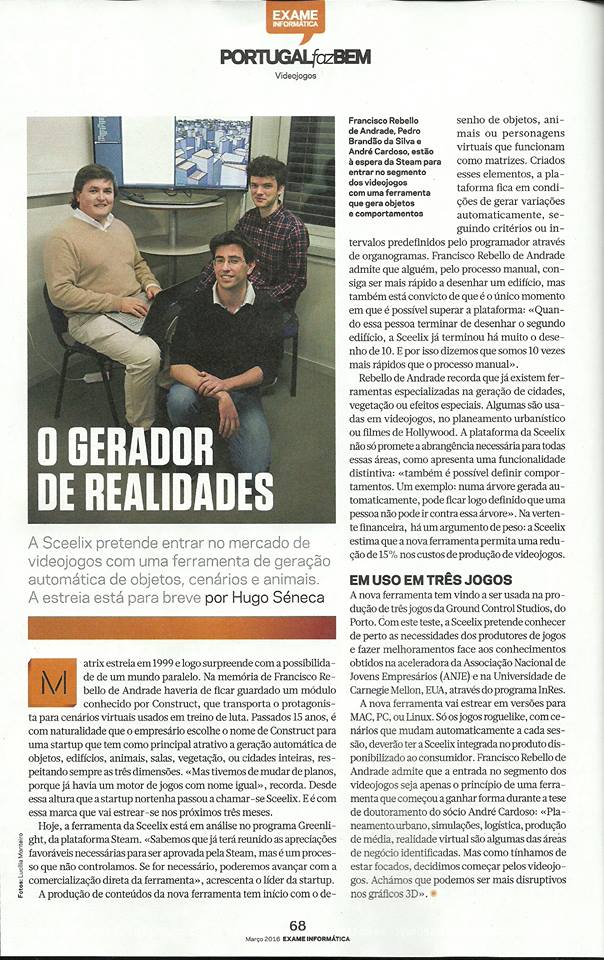We are glad to anounce two accepted papers from GIG members at Eurographics 2016 and one in CGI 2016.
Author Archive: Rodrigues
Pedro Brandão Silva’s company Sceelix in the news
Former GIG PhD student Pedro Brandão Silva appeared in Exame Informática. His company Sceelix produces a software that allows the user to create unique and complete 3D scenes, such as cities and forests, in an efficient and manageable way.
Cristiano Carvalheiro finishes his master thesis with distinction
Cristiano Carvalheiro has recently finished his master thesis and presented his dissertation entitled ‘Direct Haptics in MASSIVE’s Virtual Reality Experiences’, a work graded with distinction, supervised by Rui Rodrigues and Hugo Machado da Silva.
João Jacob presents his latest PhD developments
João Jacob on its way to finish his PhD, presents his two final prototypes. João Jacob is an expert in Unity3D, games and mobile and wearable development. http://dblp.uni-trier.de/pers/j/Jacob:Jo=atilde=o_Tiago_Pinheiro_Neto
Lab visit from American University of Sharjah of the UAE
On the 26th of January, 30 grad students from the American University of Sharjah from the United Arab Emirates. Their goal was to visit a foreign university with expertise in Interaction and Games. In the image we can see the MASSIVE project being presented to the students.
Interaction Design Summer School @ FEUP
- http://bit.ly/InteractionDesignSummerSchoolFEUP2013
- Pre-registration: until Monday, July 1st
- Communication of registration acceptance: Tuesday, July 2nd
- Registration confirmation and payment: until Thursday, July 4th
Digital Games’ Design Summer School @ FEUP
- Pre-registration (this form): until Monday, June 10th
- Communication of registration acceptance: Tuesday, June 11th
- Registration confirmation and payment: until Thursday, June 13th
- http://bit.ly/GamesSummerSchoolFEUP2013
GameDev Course (MIEIC) preliminary project presentation
The students from the Informatics Masters (MIEIC) have presented their Games' preliminary projects, and created some trailer videos about them. Here's a glimpse of some of them. This year we asked for variations of Manic Miner and Asteroids game, and had the collaboration from Pedro Cardoso, from FBAUP for ideas and design. These game prototypes were developed by the students using Unity, XNA Game Studio or Torwue2D engine, and over a period of four weeks (divided by all their other courses).
Team 1 – Manic Ladiv
|
Team 2 – Asteroids Third Person
|
Team 3 – Rulio Miner
|
Team 4 – I can't believe it's not Asteroids
|
Team 5 – FEUP Manic Miner
|
Team 6 – Save FEUP
|
Team 7 – Submerse FEUP
|
Team 8 – FEUProides
|
Team 9 – Manic FEUP
|
dataflower: harnessing heterogeneous parallelism for creative applications
Digital artists have always attempted to explore the state of the art capabilities of available computer hardware. Modern tools like [[http://processing.org|Processing]] and [[http://openframeworks.cc|OpenFrameworks]], together with good online documentation and supportive communities, have made programming an approachable skill for every artist.
However, computer hardware is undergoing a paradigm shift. Pushed by ever increasing demands for performance and limited by ever increasing costs in power usage and data transfer speeds, hardware manufacturers are gradually shifting towards designs that combine many different and highly specialised processors. Taking full advantage of this power comes with the cost of abandoning the cognitive model of the single sequential processor. For artists, this means that their tools need to evolve.
*dataflower* is a novel collaborative visual development environment that makes high performance heterogeneous parallel hardware accessible for creative applications. We propose to exploit the potential of the visual dataflow programming paradigm to allow digital artists to intuitively design high performance applications, while abstracting the challenges posed by parallel heterogeneous computing systems.
This project’s ultimate goal is fostering real-time experimentation, bridging the gap between beginners and experts, and improving communication and collaboration in multidisciplinary teams working in creative programming projects.
This project is being supervised by Professor Luis Paulo Santos (Minho University) and Professor Rui Rodrigues (FEUP)
MARES Mission

This demo presents a simulation of an underwater mission of the AUVs (Autonomous Underwater vehicles) MARES and TriMARES to detect and analyze problems in the underwater oil pipelines.
The MARES AUV (Autonomous Underwater vehicle), developed by the Ocean Systems Group (Oceansys) from INESC-TEC and FEUP, is a submarine with a length of 1.5mts and a diameter of 20 cm. It is able to reach a maximum horizontal speed of 2m/s, and possesses a series of on-board sensors that are designed to aid the vehicle in its movement and location.
The TriMARES is a 3-body autonomous underwater vehicle developed by INESC-TEC, based on the MARES design, and designed to provided extra payload capability, including high quality video and sonar.
The demo was produced in the context of INESC TEC, using Unity, and a basis engine to control the vehicles based on XML specifications was developed. The goal is to serve as a starting point for a system for planning, coordination and control of underwater missions.
Development: Ricardo Gonçalves
Coordination: António Coelho, Rui Rodrigues
Copyright: INESC TEC 2012


